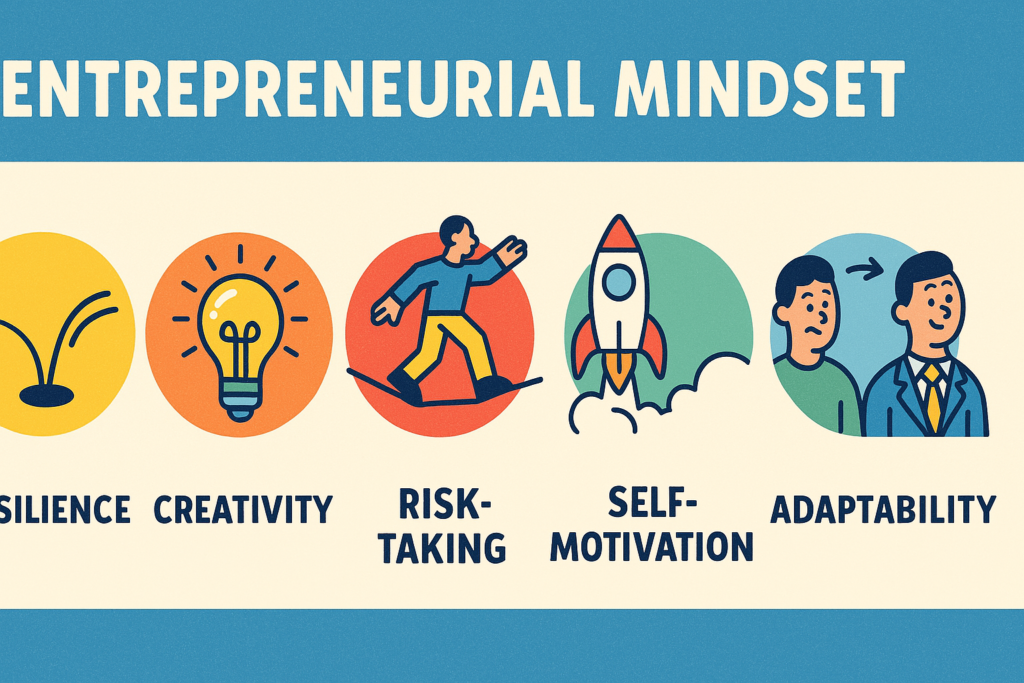According to the Global Entrepreneurship Monitor, around 100 million businesses are launched every year. That’s roughly three startups every second! Yet, a study by the Small Business Administration found that only 50% of businesses survive beyond the first five years. So, what separates the success stories from the failures? The answer is often an entrepreneurial mindset.
Think about Elon Musk, Oprah Winfrey, or Steve Jobs. They didn’t just stumble upon success; their mindset played a significant role. An entrepreneurial mindset isn’t just for business owners; it’s for anyone who wants to think creatively, solve problems, and take control of their future.
A report by LinkedIn revealed that entrepreneurial skills are among the top 10 most in-demand skills in 2025. Whether you’re starting a business, climbing the corporate ladder, or navigating life’s challenges, having an entrepreneurial mindset can be your secret weapon.
But wait, there’s more! According to a Gallup study, 60% of Americans dream of starting their own business, but only 14% do. Why? Often, it’s the lack of the right mindset.
So, buckle up as we dive into the world of entrepreneurial thinking. By the end of this article, you’ll not only understand what an entrepreneurial mindset is but also how to develop it and see real-world examples that will inspire you.
What is an Entrepreneurial Mindset and Its Importance?
An entrepreneurial mindset is a way of thinking that enables individuals to identify opportunities, take calculated risks, and innovate continuously. It’s about being resilient, adaptable, and driven by a desire to create value.
Why is it important? According to the Kauffman Foundation, entrepreneurs are responsible for nearly all net new job creation in the U.S. over the past three decades. This mindset fuels innovation, economic growth, and societal progress.
In a rapidly changing world, having an entrepreneurial mindset means being prepared for uncertainty. It’s not just about starting a business; it’s about being proactive, thinking creatively, and solving problems efficiently. Whether you’re a student, employee, or business owner, this mindset can help you stand out.
Moreover, a study by the Harvard Business Review found that companies led by entrepreneurial-minded leaders are 45% more likely to be high performers. Clearly, this mindset isn’t just beneficial; it’s essential.
Why is it important? Here’s why:
- Problem-Solving: Entrepreneurs see problems as opportunities.
- Adaptability: They thrive in uncertainty and adapt to change.
- Innovation: They constantly look for better ways to do things.
- Resilience: They don’t give up, even when things get tough.
How I Developed an Entrepreneurial Mindset

A few years ago, I was stuck in a job I hated. I felt like a cog in a machine, with no control over my future. One day, I decided to take a leap of faith and start my own side hustle, a small online store selling handmade candles.
At first, it was a disaster. I had no customers, no sales, and no idea what I was doing. But instead of giving up, I started thinking like an entrepreneur. I researched my market, experimented with new ideas, and learned from my mistakes. Slowly but surely, my business grew.
Today, my candle business is thriving, and I’ve even quit my 9-to-5 job. The secret? Developing an entrepreneurial mindset. It taught me to see challenges as opportunities and to keep pushing forward, no matter what.
Entrepreneurial Mindset Characteristics

An entrepreneurial mindset is built on several key characteristics:
1. Resilience
- Entrepreneurs face failures but bounce back stronger.
- According to a study by CB Insights, 42% of startups fail due to lack of market need, but resilient entrepreneurs pivot and try again.
2. Creativity
- They think outside the box to solve problems.
- A report by Adobe found that 73% of companies that invest in creativity see higher revenue growth.
3. Risk-taking
- Calculated risks lead to innovation.
- According to the Global Entrepreneurship Monitor, 40% of entrepreneurs believe risk-taking is crucial for success.
4. Self-motivation
- Entrepreneurs are driven by their goals.
- A survey by Cox Business found that 55% of small business owners started their business to be their own boss.
5. Adaptability
- The business landscape is ever-changing.
- According to McKinsey, adaptable businesses are 33% more likely to outperform their peers.
How to Develop an Entrepreneurial Mindset
Developing an entrepreneurial mindset involves:
- Continuous Learning: Stay curious and keep learning.
- Networking: Build relationships with like-minded individuals.
- Embracing Failure: Learn from your mistakes.
- Setting Goals: Clear goals keep you focused.
Real-World Examples of an Entrepreneurial Mindset
- Elon Musk: From PayPal to Tesla, Musk’s entrepreneurial mindset is evident in his willingness to take risks and innovate.
- Oprah Winfrey: Overcame numerous challenges to build a media empire.
- Sara Blakely: She Started Spanx with $5,000 and built a billion-dollar brand through creativity and resilience.
Overcoming Challenges with an Entrepreneurial Mindset
1. Lack of Capital
- Many entrepreneurs struggle to secure funding for their business ideas.
- Sara Blakely, founder of Spanx, started her business with just $5,000 in savings. Unable to find investors initially, she handled every aspect of her business herself, from packaging to marketing. Her perseverance paid off when Oprah Winfrey endorsed Spanx, catapulting the brand to success.
2. Fear of Failure
- Fear of failure can prevent entrepreneurs from taking the first step.
- Howard Schultz faced rejection from over 200 investors when trying to fund Starbucks. Instead of giving up, he believed in his vision of bringing the Italian coffeehouse experience to the U.S. Today, Starbucks is a global brand with thousands of locations worldwide.
3. Fierce Competition
- Standing out in a crowded market is a major hurdle.
- Airbnb faced significant competition from established hotel chains. Brian Chesky and Joe Gebbia overcame this by focusing on user experience, offering unique accommodations, and building a strong community, turning Airbnb into a multi-billion dollar company.
4. Maintaining Work-Life Balance
- Entrepreneurs often struggle with balancing their personal and professional lives.
- Arianna Huffington, co-founder of The Huffington Post, collapsed from exhaustion due to overwork. She then prioritized well-being and mindfulness, which not only improved her health but also became the foundation for her new venture, Thrive Global, promoting work-life balance.
5. Adapting to Change
- Rapid market changes and technological advancements require constant adaptation.
- Netflix started as a DVD rental service, but when streaming technology emerged, Reed Hastings pivoted the business model to focus on streaming. This adaptability helped Netflix become a global entertainment giant.
Entrepreneurial Mindset in Education

Schools can develop an entrepreneurial mindset in children from an early age by fostering creativity, critical thinking, and problem-solving skills through project-based learning and hands-on activities. Encouraging students to take initiative, work on collaborative projects, and explore innovative solutions helps them develop confidence and resilience. Incorporating subjects like financial literacy, business basics, and technology from primary school equips children with essential skills for entrepreneurship. Schools can also introduce mentorship programs where successful entrepreneurs share their experiences, inspiring young minds to think ambitiously. Encouraging curiosity, risk-taking, and adaptability through open discussions, competitions, and creative assignments ensures that students are not afraid to fail but see challenges as opportunities. By nurturing these qualities early, schools can lay the foundation for future entrepreneurs who are ready to innovate and lead in any field they choose.
The Role of Technology in Entrepreneurial Mindset
1.Access to Global Markets
Technology enables entrepreneurs to reach customers worldwide through e-commerce platforms, social media, and digital marketing, expanding their business beyond geographical boundaries.
2. Enhanced Communication and Collaboration
Tools like video conferencing, project management software, and instant messaging make it easier for entrepreneurs to collaborate with teams, partners, and clients globally, improving efficiency and innovation.
3. Automation and Efficiency
Technologies such as AI, automation software, and cloud computing streamline operations, reduce costs, and allow entrepreneurs to focus on strategic growth and innovation.
4. Data-Driven Decision Making
Entrepreneurs can use data analytics tools to gather insights on market trends, customer behavior, and business performance, enabling informed and strategic decisions for business success.
5. Innovation and Product Development
Technology fosters innovation by providing platforms for rapid prototyping, digital design, and testing, allowing entrepreneurs to develop and refine their products or services quickly and effectively.
Entrepreneurial Mindset vs. Fixed Mindset
1. Approach to Failure
- Entrepreneurial Mindset: Sees failure as a learning opportunity and a stepping stone for growth.
- Fixed Mindset: Fears failure and often avoids challenges to prevent making mistakes.
2. Adaptability
- Entrepreneurial Mindset: Embraces change, seeks new opportunities, and adapts quickly to evolving situations.
- Fixed Mindset: Prefers stability and routine, resisting change due to fear of the unknown.
3. Effort and Growth
- Entrepreneurial Mindset: Believes that effort and perseverance can lead to improvement and success.
- Fixed Mindset: Believes that abilities and talents are static and that effort won’t significantly change outcomes.
How You Can Develop an Entrepreneurial Mindset

- Stay Curious: Always seek new knowledge.
- Take Calculated Risks: Don’t fear failure, learn from it.
- Be Resilient: Bounce back from setbacks.
- Network Actively: Surround yourself with entrepreneurs.
Conclusion: Your Entrepreneurial Journey Starts Now!
An entrepreneurial mindset is more than just a buzzword, it’s a way of thinking that can transform your life. By embracing resilience, creativity, and adaptability, you can overcome challenges, seize opportunities, and achieve your goals.
Whether you’re dreaming of starting your own business or simply want to stand out in your career, developing an entrepreneurial mindset is the key to success. So, what are you waiting for? Start thinking like an entrepreneur today and unlock your full potential!





